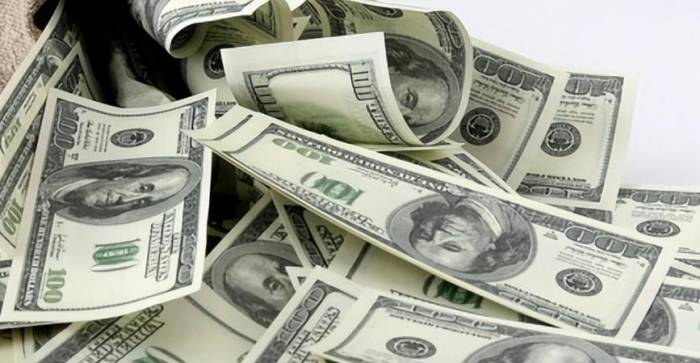U.S. Bonds Surge!
As the world watches closely, the financial landscape in the United States is demonstrating alarming shifts. On November 23rd, 2023, the national debt of the United States surpassed an unprecedented $36 trillion, a figure that marks a new chapter in fiscal irresponsibility. This rapid escalation, reaching this milestone only a few months after hitting $35 trillion, is not simply a statistic; it’s a strong forewarning of impending fiscal crises that have significant implications not only for America but for the entire global economy.
Just over the past decade, national debt has surged dramatically, leaping from approximately $23.64 trillion in 2014. The increase of more than $12 trillion within the last ten years showcases not only an alarming trend but also a systemic issue that is deeply entrenched within the polices and governance of the nation. The current pace sees an increase of roughly $87 billion daily — a rate that defies fundamental economic understanding and calls into question the sustainability of such fiscal behavior.
Advertisement
Underlying this explosive growth of the national debt is a flawed governance system, characterized by systemic inefficiencies, political gridlock, and an alarming trend of deficit spending that poses unsettling questions about the future of the American economy. Analysts like Maya MacGuineas from the Committee for a Responsible Federal Budget have attempted to normalize this crisis by likening it to the changing of seasons; however, such comparisons fall drastically short of capturing the staggering reality. This is not merely a cyclical phenomenon; it is a de-stabilizing force that could very well lead to a financial catastrophe.
Furthermore, as the Federal Reserve has implemented interest rate hikes to counteract inflationary pressures, the implied paradox is that such efforts are somewhat fruitless against the relentless surge of new debt. The result? The U.S. government anticipates spending a staggering $882 billion on interest payments alone in 2024, a significant jump from around $659 billion in 2023. This burgeoning interest burden has started to erode the operational efficacy of the federal government, with expenditures on debt servicing consuming a greater chunk of the budget.
Amid this chaos, the government appears nonchalant, a shocking detachment from the realities facing its citizens. As the clock ticks down to December 20, when a temporary funding bill will expire, there looms the threat of a government shutdown — a scenario that has too frequently become a norm rather than an exception. The spectacle of a government at odds with itself showcases the profound dysfunctionality of American governance. Political infighting seems to take precedence over national priorities, leading to a deepening rift in the federal fabric.
The impending crisis surrounding the debt ceiling in early 2025 is going to be another pivotal moment. The government will be on the brink of financial reckoning just as a new administration prepares to take the helm. However, based on previous patterns, one can only expect heightened partisanship that may complicate the desperate necessity for responsible financial management. The specter of default looms larger, and with it, the risk of a financial meltdown that could resonate worldwide.
Sadly, the severe issues confronting American debt represent more than just fiscal miscalculation. The systemic rot that informs this crisis indicates a nation that has grown dependent on borrowing rather than seeking fundamental reforms to its budgetary practices. The historical pattern exhibits a preference for incurring additional debt over implementing necessary austerity measures — a strategy that ultimately promotes decay rather than resilience. Without a radical shift in fiscal policy mentality and effectiveness, the prospect is clear: a nation undoubtedly on the edge of financial collapse.

The repercussions of the U.S. debt crisis will not remain contained within its borders. As the world's largest economy, any signs of instability within the U.S. financial framework send shockwaves throughout global markets. A dissatisfaction with the U.S. dollar as a reserve currency, combined with increasing interest rates that lure capital back to American shores, creates a paradox that could lead to significant destabilization elsewhere. Countries with weaker financial infrastructures could face crippling capital outflows alongside depreciating currencies, further exacerbating their own economic challenges.
At the core of these escalating issues lies the entrenched nature of the system itself. The inability to rein in excessive spending, coupled with political impasses and the Federal Reserve’s inadequate measures in the face of glaring fiscal incompetence, serves to highlight the disarray at the heart of American governance. Meanwhile, disillusioned citizens, grappling with a rising cost of living and the specter of potential government shutdowns, witness their quality of life deteriorating. The burden of this economic crisis will inevitably fall on the backs of the average American, while politicians seem oblivious to the grave implications of their mismanagement.
Ultimately, the national debt, now standing as a ticking time bomb, speaks to a larger existential crisis. This financial encumbrance threatens to not only destabilize America but also risks lighting a fuse that could ignite a worldwide financial crisis. The indifference and self-serving attitudes among political elites stand in stark contrast to the serious ramifications of their failures, leading to a profound sense of betrayal by the very system meant to provide security and stability.
As the narrative unfolds, the $36 trillion debt illustrates not merely an economic dilemma but a profound manifestation of deep-seated systemic dysfunction. When fractionalizing pressures threaten to unravel the very fabric of the U.S. economy, it raises a cautionary tale about the limits of unchecked ambition and shortsighted governance. The precipice of collapse may be closer than many anticipate; as warnings become more pronounced, the inevitability of confronting fiscal realities becomes urgent. History will judge the current American leadership harshly for their choices; the world watches, bracing for the ultimate fallout of decisions made from fear and avarice.
Post Comment